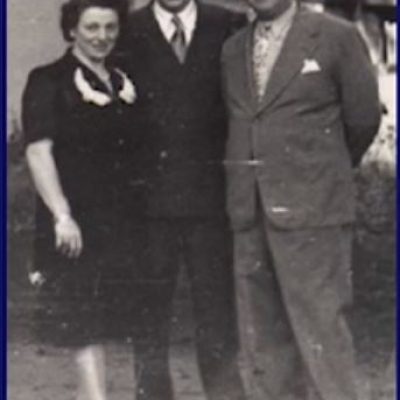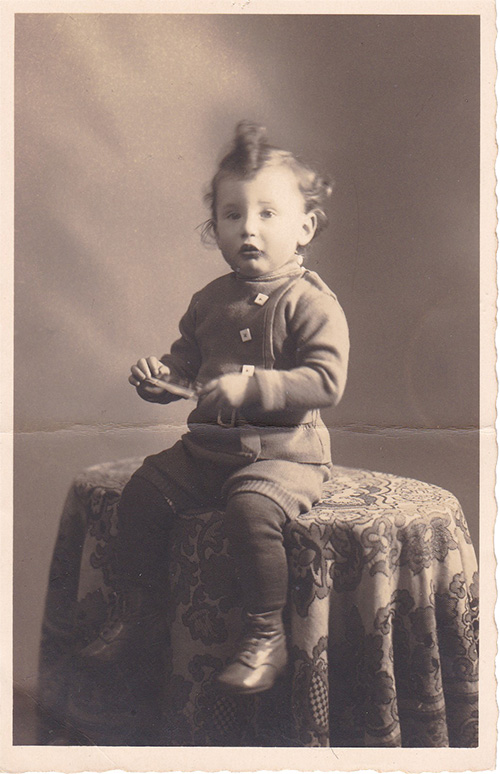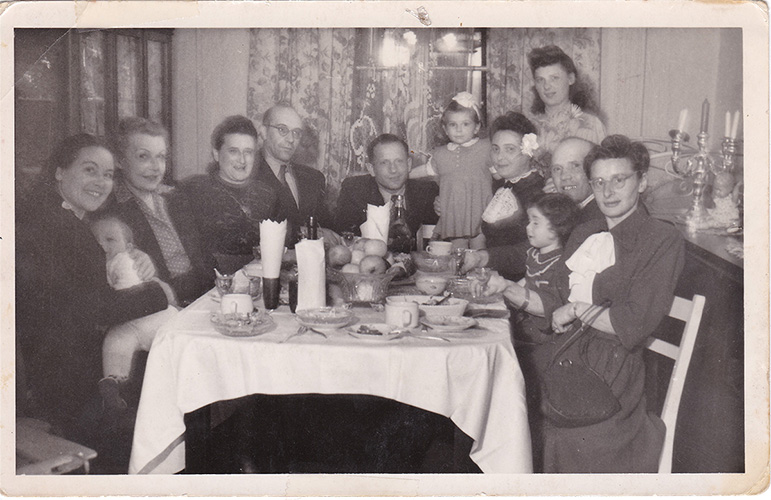Herbert Kohn
Biography
Born in 1926 in Frankfurt am Main, Germany, Herbert Kohn could trace his family’s lineage in the region back to the 1400s. His father, Leo, as well as both grandfathers were World War I veterans.
The Kohns were an upper middle-class liberal Jewish family that lived a very cultured life. “We were raised and brought up not as German Jews, but as Jewish Germans,” Herbert explained.
On his first day of school, according to German custom, Herbert had his photo taken with his Schultüte, a cone-shaped cornucopia filled with sweets and treats given to children when they enter elementary school. It was later that school year, in 1933, that 6-year-old Herbert realized that life had changed completely. He was called out of his public-school classroom and told to get his thing and go home, that “Jews are not allowed in public schools anymore.” From that day forward, life became increasingly difficult.
Herbert and his brother Ernest transferred to the Philanthropin, a private Jewish school in Frankfurt, and when Leo lost his position as a manufacturer’s representative, he took a position with the sports program at the Philanthropin.
With the passage of the Nuremberg Laws in 1935, it was apparent that Germany was no longer a welcoming home. The Kohns began working on a family tree in hopes of finding family members who might be able to help them with emigration. After sending letters all over the world, a third cousin from Birmingham responded and offered to be their sponsor. While their visa came in 1938, it would not become valid until 1940, and so they waited.
During the events of Kristallnacht in November 1938, Leo was taken from his home and sent to the Buchenwald concentration camp. Desperate to leave, Irene reached out to a distant cousin in London who agreed to sponsor the family for a one-year transit visa.
As a military veteran, Leo was released from Buchenwald after three weeks. His hair was white, and he had lost 30 pounds; he shared stories of unspeakable abuses. He fled the next morning to England, and the rest of the family followed a few months later. During their year in England, Herbert attended a refugee boarding school in Margate, England – Rowden Hall School – run by B’nai B’rith and the Joint Distribution Committee, where he became a bar mitzvah.
In April 1940, the family immigrated to the US with the help of distant relatives, Dorah (Heyman) and Mervyn Sterne of Birmingham. Upon their arrival in New York, the Kohns were given the option of staying in New York, going to Chicago, or moving to Alabama to learn how to farm. They chose Alabama and traveled to Birmingham where they met the Sternes, who had arranged for the family to live on a dairy farm in Demopolis.
A small cottage had been built for them, and they all went to work on the farm alongside the African Americans who were experiencing the effects of racism and segregation in the American South. Every morning at 5:30, 13-year-old Herbert was at the barn milking cows and then walked a mile and a half to the bus stop to attend Demopolis High School. He was placed in the 9th grade; his best subject was English.
The minute Herbert became 18 years old, he volunteered for early induction into the US Army to fight the Nazis, but by the time he arrived in Europe, the war was over. After the war, he became a reservist and eventually attained the rank of Lieutenant Colonel.
Herbert graduated from Auburn University with a degree in Agriculture, majoring in Dairy Husbandry. He later became a Certified Public Accountant and worked in Columbus, Georgia for several years. He later joined Cohn Communities in Atlanta serving as Chief Financial Officer until his retirement in 1991 as President/CEO. He then served as Executive Director of the new Urban Residential Development Corporation for the City of Atlanta, promoting the availability of affordable housing for families in the low and moderate income range, retiring in 1998.
Herbert was a prominent civic leader and volunteer and told his family story widely. His mission in life was “to make the world a better place.”
Herbert felt very strongly that, “The lessons of the Holocaust must be passed on to our children, grandchildren and others to learn how to prevent and stop crimes against humanity from happening again and again.”
Photos & Documents
More Information
Frankfurt
Ernst (Ernest) Ferdinand Markus Kohn
(September 24, 1923 / Frankfurt – August 4, 2004 / Anniston)
Elaine Lois Friedman
(1929 / Columbus, GA – 1987 / Atlanta, GA)
Frances Butler (Goodman)
Married 1988, Atlanta, GA
Kristallnacht
Emigrated to England, May 1939
Resources
-
History & Related Resources
Digital copies of photos from the William Breman Jewish Heritage Museum, Atlanta, GA and the USC Shoah Foundation.





















